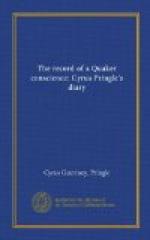THE RECORD OF A QUAKER CONSCIENCE
CYRUS PRINGLE’S DIARY
WITH AN INTRODUCTION BY RUFUS M. JONES
New York
THE MACMILLAN COMPANY
1918
All rights reserved
Copyright, 1913 BY THE ATLANTIC MONTHLY COMPANY
Copyright, 1918 By THE MACMILLAN COMPANY
Set up and printed. Published, February, 1918
[Transcriber’s Note:
Several unusual spellings have been kept as in the original, including: northermost ("Fairhope meeting-house is in the northermost country”) and comformable ("yet probably in a manner comformable to").
In some cases, variant spellings of the same word are used, as in the case of “enrolment” and “enrollment”, “therefor” and “therefore”, “well meant” and “well-meant”. These have been comfirmed with the original.
In referring to God, there is also inconsistency in the use of “His” versus “his” and “Him” versus “him".]
INTRODUCTION
The body of this little book consists of the personal diary of a young Quaker named Cyrus Guernsey Pringle of Charlotte, Vermont. He was drafted for service in the Union Army, July 13th, 1863. Under the existing draft law a person who had religious scruples against engaging in war was given the privilege of paying a commutation fine of three hundred dollars. This commutation money Pringle’s conscience would not allow him to pay. A prosperous uncle proposed to pay it surreptitiously for him, but the honest-minded youth discovered the plan and refused to accept the well meant kindness, since he believed, no doubt rightly, that this money would be used to pay for an army substitute in his place. The Diary relates in simple, naive style the experiences which befell the narrator as he followed his hard path of duty, and incidentally it reveals a fine and sensitive type of character, not unlike that which comes so beautifully to light in the Journal of John Woolman.
This is plainly not the psychological moment to study the highly complex and delicate problem of conscience. The strain and tension of world issues disturb our judgment. We cannot if we would turn away from the events and movements that affect the destiny of nations to dwell calmly and securely upon our own inner, private actions. It is never easy, even when the world is most normal and peaceful, to mark off with sharp lines the area of individual freedom. No person ever lives unto himself or is sufficient to himself. He is inextricably woven into the tissue of the social group. His privileges, his responsibilities, his obligations are forever over-individual and come from beyond his narrow isolated life. If he is to be a rational being at all he must relate his life to others and share in some measure their triumphs and their tragedies.




